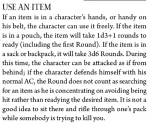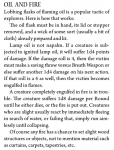squeen
8, 8, I forget what is for
Also, while flipping through the LotFP text I stumbled on to a few other tidbits. Honestly, the fascade of LotFP is quite off-putting to me---gore, sexuality, etc.---but there is a fairly nice codification of some of the stickier things in B/X. It is better thought out than I expected.
Here's some "house rules" I kind of liked (I know some are not unique to LotFP):

Silver Weapons


Melee Options


I would be curious about how these particular things are handled in alternate systems (e.g. 5e), if folks would care to chime in.
Here's some "house rules" I kind of liked (I know some are not unique to LotFP):

Silver Weapons


Melee Options


I would be curious about how these particular things are handled in alternate systems (e.g. 5e), if folks would care to chime in.
Last edited: